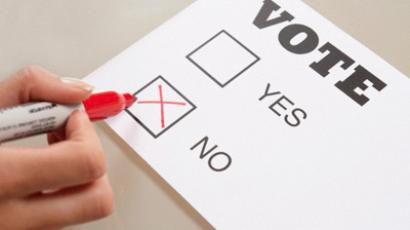‘Despite economic and other challenges, Obama has edge over Romney’
Mitt Romney is now the Republican Party’s official candidate for president, and Barack Obama is all but certain to become the Democratic nominee next week. RT discussed the race for the White House with scholar and researcher Ivan Eland.
RT: What do you read into the GOP convention?Ivan Eland: Conventions in the US now are sort of beauty contests. They used to have a lot more effect. The nominee was actually chosen at the conventions, but now we have a party primary and caucus system which does that. So it is just sort of a coronation of the nominee of a particular party. And they script them pretty heavily. Romney has complete control over the convention. There are a few Ron Paul supporters that kicked up a little bit of dust. But largely even Ron Paul is playing the game inside the party. So you don’t see disputes or anything like that over the platform or anything like that.RT:The beginning of Romney's campaign was very rough. There was a lot of competition, a lot of other candidates, who basically discredited him and yet now at the convention it seems that the GOP just wants Romney to be the president.IE: That is a tradition in American politics. Usually, they have a battle during the primaries calling each other all sorts of names, criticizing each other’s policies, and, then, all of a sudden you see how the people who were criticizing him before flip and start supporting him when he gets enough delegates.RT:Do you think it’s Romney’s time now for the US?IE: Usually on the Republican side they nominate the person next in line to the one who lost last time. The Democrats are a little bit more iffy. But I think it basically comes down to these conventions, which are surface phenomena – they don’t mean much. People who study the elections in the US say it is not really between the two candidates, but rather a referendum on the current administration. So they could have almost anybody running, and the economy is bad, and it’s going to be very close, but I think some of the models predict Obama still eking out a very close victory. But it’s going to be close and those models could be off as well.I think Obama has an intrinsic advantage in the Electoral College because in the United States, as we saw in 2000, we don’t elect the President on popular vote, which can sometimes be different than the Electoral College. So we really don’t have a national election, we have a state-by-state election. And so the candidates have to win so many states which add up to 270 electoral votes. That can sometimes differ from the total national popular vote total. So this could be another election where that happens, we’ll see, but Obama has a slight edge in the electoral map. RT: The economy is bad, but Romney’s policy’s are too far to the right, and he seems to be moving further to right, choosing Paul Ryan as his running mate, for example. Many people accuse him of wanting to appeal to the right wing of the Republican Party. Do you think the US is moving in that direction, or is it just politics that brought him there?IE: The Republicans seem to think that they can energize their base more than the Democratic base because the Democratic base in kind of disappointed with Obama in certain respects. And if they can energize their base, they can win that way, though that’s a bit iffy. I think they may have made a bad choice in Paul Ryan. They basically decided to mobilize their base instead of going after independent voters. Romney would have picked somebody that was like Chris Christie or somebody that was more moderate to go after the center. Their choice of Ryan may have been a mistake because most of the conservatives are going to vote against President Obama. So they really didn’t need somebody like Paul Ryan, they needed somebody to get people in the middle, particularly suburban women. The comments such as the ones made by Republican senatorial candidate Todd Akin on abortion and rape really disaffect women. The Republicans don’t really want to talk about that, the Republicans want to talk about the economy, and those social issues, which are divisive, might turn key voting blocks like suburban women against them. And in a close election they really do need everybody on their side.RT:Do you think Romney is able to appeal to the middle?IE: It’s hard to say where he stands on many issues. He’s kind of moved around a lot. While that’s believable, after you do that too much, people label you as a flip-flipper, flipping back and forth between views. John Kerry was labeled with that on the Democratic side in 2004. Mitt Romney has been inconsistent on abortion, assault weapons and even healthcare. In fact, Obama and Romney have both switched positions on healthcare. Obama used to be against what became his own healthcare plan because Hillary originally proposed it during the primaries. And, of course, Mitt Romney was the guy who dreamed up the whole thing when he was Governor of Massachusetts. And now he is against the healthcare plan. So you never know what’s going to happen or what positions they’re going to take.RT: But don’t you think changing positions is going to weaken Romney’s campaign, especially now, when you’re talking healthcare, the economy, jobs?IE: It does when you flip-flop on positions, but I think it’s really a referendum on Obama. That’s what the political scientists who study these things say. I mean they could put anybody in the chair and one of the key factors is the economy. So we’ll have to see if the GOP will the keep the offensive on the economy. It’s not really the unemployment rate, it’s the change. The economy would have had to improve by May to help Obama, but that didn’t happen. The fundamentals of the election are set months in advance. An election this close, where they’re pulling everything out on both camps to attack the other one, they’re going to need every vote that they can.RT: Obama is faced with the economy, but what are the challenges facing Romney in this election?IE: I think the main one is getting distracted by the social issues. Many people don’t agree with the social issues in the Republican Party, because they’re very much to the right of the population. I think it's those key voting groups that would be shy about voting for Romney, so they kind of have to keep that under the table. This just sprang up with Akin saying these things about rape, which were really quite outrageous. RT:But Mitt Romney completely distanced himself from him, didn’t he?IE: He did, but the platform and his vice presidential candidate both said ‘no exceptions for rape or incest’ in the anti-abortion clauses. So Mitt Romney has personally done that, but he’s still weighted with this baggage. And also, there are many women who are against abortion out there and they probably will vote Republican, but you need to try to get votes in the middle, which is a key constituency. The Republicans have two other problems. The support Republicans used to get from working union workers during the Reagan era has dwindled because we have fewer manufacturing jobs. The other thing is the Hispanic population has been enraged by some of the Republican stances on immigration, and that’s the fastest growing minority. You see a lot of Western states like Colorado, Nevada, which used to be solid Republican, moving to the Democratic camp, or at least becoming neutral. So that’s where Obama has gotten an advantage on the electoral map in the state-by-state election.RT: Do you think Romney has any leverage in foreign policy?IE: If anything, I think he has less of an advantage. He’s trying to make a big deal about the Iran thing, but Obama killed Osama Bin Laden, and here, Osama Bin Laden is villain number one. It took him ten years, and George W. Bush never got him, so that’s an advantage for Obama’s camp here in the United States. Romney has been very hawkish, but people are tired of two wars here, they want to get out of these wars. So the fact that he’s got all these neoconservative, hawkish foreign policy advisors is a detriment to him. Foreign policy traditionally hasn’t played a major role in US elections because it’s usually domestic issues and the economy, and in this it’s even more so because we’ve had this long recession and now a long, sluggish period of recovery. So I think even more so, people are turning inward because they want to get rid of these two wars and get back to what they were doing. That’s why it’s going to be mainly on the domestic issues. So if anything, his views on foreign policy are a handicap for him.RT: The GOP is criticizing Obama on Syria, Iran and other issues. It seems that Romney is trying to win base for him by criticizing Obama on these issues. IE: They are criticizing him but most American voters don’t really care about issues such as foreign policy and defense. They don’t know what our policy should be in many of those countries because they’re not even familiar with most of those countries. But they know their own paycheck, they know the educational system, they know the state of the highways. They know the domestic stuff, and that’s why US elections tend to focus on that unless there’s some big war going on, or unless there is some crisis like the Iranian hostage crisis during Jimmy Carter’s 1980 campaign. Then it becomes a bit more of an issue. RT:It’s less than three months before the elections and Obama is still leading. Do you that will be the case until November 6, or do you see that changing?IE: The polls are about even, depending on which polls. But those polls don’t mean anything, because the election is state-by-state. You have to look at the electoral map and Obama does have an edge there. RT: Do you think Obama needs a miracle for the economy to keep leading the elections? Or is it also the fact that Romney has issues with healthcare?IE: The economy is not going to help Obama, but he’s probably benefited from these groups that have become disaffected with Republicans, like Hispanics. I think he’s gotten an electoral edge because of that.














